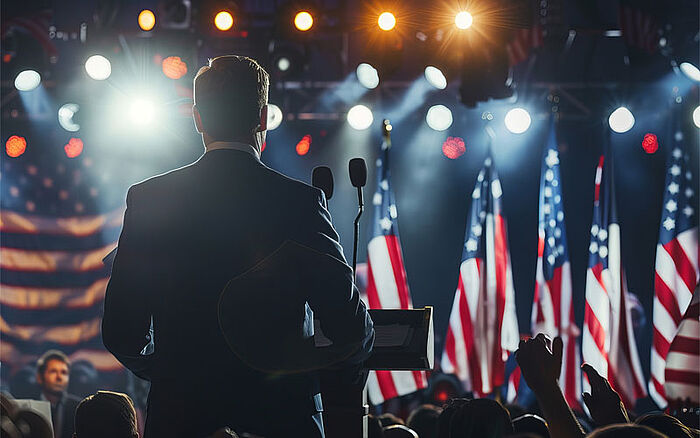
Copyrighted songs in political campaigns
The recent U.S. elections have concluded, and Germany is also preparing for new ballots. Politicians and parties often use music at their election rallies to create an emotional atmosphere supporting their campaigns. However, many musicians view this critically, especially when their songs are used by parties that do not align with their own political convictions.
In Germany, Herbert Grönemeyer is resisting the use of his music in such contexts. Recently, the Junge Union, the youth organization of the Christian Democratic Union of Germany (CDU), played Grönemeyer's well-known song "Zeit, dass sich was dreht" (Time for things to change) to introduce the party's lead candidate, Friedrich Merz. Grönemeyer subsequently issued a cease-and-desist letter through his lawyer, demanding that the Junge Union refrain from using his song for campaign purposes. A similar situation occurred with the political party Bündnis 90 / Die Grünen. Their lead candidate, current Federal Minister for Economic Affairs, Robert Habeck, hummed the melody of the same song in a video published on X, wherein he announced his candidacy for chancellor. This also angered the singer. Through his media lawyer, he stated that he "fundamentally does not wish for his person or his songs to be co-opted by political parties for any kind of campaign advertising, let alone without his consent."
Grönemeyer is not the first to publicly oppose the politicization of his songs. Before him, the Cologne carnival band Die Höhner and pop singer Helene Fischer took legal action against the use of their songs at political events. In 2015, both obtained injunctions from the Thuringian Higher Regional Court against the far-right NPD (now known as Die Heimat or HEIMAT), prohibiting the party from using the artists' songs at rallies without their permission.
Copyright as a legal basis
In Helene Fischer's case, the Higher Regional Court ruled in favor of the singer (Judgment of March 18, 2015, Case No.: 2 U 674/14), citing Section 75 of the Copyright Act (Urheberrechtsgesetz – UrhG), which allows artists to oppose certain uses of their performances if they impair the artist's personal interests or artistic reputation. The Court argued that the decision to appear publicly as apolitical lies solely with the artist. Thus, explicit consent is required not only for product advertising but also for political campaigns. According to the Court, the specific political party involved is not the primary consideration.

Helene Fischer's legal battle underscores a growing movement among artists to protect their work from unauthorized political use, defending both creative expression and personal principles.
A month later, the Thuringian Higher Regional Court ruled similarly in the Höhner case (Judgment of April 22, 2015, Case No.: 2 U 738/14), this time based on Section 14 UrhG. The Court noted that associating an artist's work with political party advertising, even indirectly, significantly risks infringing the creator's interests, as political affiliations should be a matter of personal choice. The Court again emphasized that the specific party was not the critical factor.
Regarding the Höhner case, the Federal Court of Justice (BGH) upheld the Thuringian court's decision, adding that the question of whether creators should generally not expect their works to be used without consent at campaign events could remain unanswered. However, in this case, the integration of music into the campaign of a party against whose goals the plaintiffs had publicly spoken out and which the Federal Constitutional Court deemed anti-constitutional justified prioritizing the interests of the creators.
What about Grönemeyer?
The question then arises: How does Grönemeyer's case stand, since he also relies on his author's moral rights under Section 14 UrhG? What distinguishes it from the earlier disputes is that those plaintiffs opposed the use of their works by a far-right, anti-constitutional party. This association was deemed detrimental to the performers as they were linked to a political party whose goals were supported by only a small segment of the population. While the Thuringian court maintained that the specific party was not the decisive factor, it is doubtful whether the same reasoning could be applied to pro-democratic parliamentary parties.
Additionally, what happens if the party has purchased a license to use the music? In Germany, musicians typically transfer their exploitation rights to a collective rights organization, like GEMA, which grants licenses to third parties for a fee. According to the "principle of purpose transfer" (see BGH judgment of June 10, 2009 - I ZR 226/06), these rights typically only cover predictable forms of public performance, which do not include use in political campaigns (BGH decision of May 11, 2017 - I ZR 147/16). In such cases, the rights remain with the creator, who can prohibit unauthorized uses like those by political parties. Even when commercial rights are transferred, artists can still invoke their author's moral rights.

Herbert Grönemeyer's resistance to the use of his music in political settings emphasizes the intricate relationship between an artist's creative authority and the broader societal mechanisms of copyright law and public discourse.
Thus, the legal boundaries need to be carefully considered. Copyrights cannot serve as a universal tool for musicians to block every use of their work that clashes with their beliefs. The protection under Section 14 UrhG must end where the creator's legitimate interests are not significantly impaired or where competing rights, such as the freedom of political expression, outweigh the personal (copy)rights of the author. The context, extent of infringement and public interest are key factors to consider in such cases, requiring a precise weighing of interests to avoid legal uncertainty.
Though the present Grönemeyer row is unlikely to be settled in court, a ruling on the matter would be insightful.
A look across the Atlantic
In the United States, campaign events often resemble pop concerts, with presidential candidates frequently backed by celebrities from Hollywood, sports and the world of business. Campaign songs are a staple of U.S. politics, dating back to the very beginning, with George Washington's 1788-89 campaign and "Follow Washington." Other notable examples include Frank Sinatra rewriting "High Hopes" for John F. Kennedy's 1960 run and Kamala Harris using Beyoncé's "Freedom" for her presidential bid.
Nonetheless, like their German counterparts, many U.S. musicians take exception to having their songs used at election rallies without their consent. This has led to complaints and cease-and-desist letters, particularly during President Donald Trump's three campaigns. In the United States, collective rights organizations like ASCAP or BMI provide blanket licenses for music, but performers can exclude their works from political use, as the Rolling Stones did in 2020. However, copyright law offers only limited remedies for the appropriately licensed public performance of original songs. Consequently, disputes are rarely resolved in court. Instead, musicians often make their protestations public to distance themselves from candidates or political programs.
Civil vs. common law on copyrights
The moral rights of authors are conceived differently by the main jurisprudential systems, with German copyright and U.S. copyright based on distinct foundations. German copyright enshrines the author as creator and their personal relationship to the work. The moral rights embedded within the work inseparably connect the author's personal and economic interests. U.S. copyright, on the other hand, focuses on economic principles. Common law copyright is largely based on a commercial rationale, placing the personal interests of the author behind monetary considerations.

Unlike the United States, where copyright is focused on commercialization, Germany ensures moral rights protect artists' personal connection to their work, granting them a greater say in political usage.
This leads to the idea that works, such as music used in political campaigns, are primarily economic assets. Consequently, the decision-making and exploitation rights of a work are often not granted to the author (i.e., the musician) but to the economic rights holders. The author retains limited veto rights or the option to rely on other legal frameworks, such as trademark law (the Lanham Act), to prevent potential misuse of copyrights by the rights holders. However, the protection of moral interests is only ancillary. Therefore, the prospects for an artist in the United States are somewhat curtailed. If the campaign venues have acquired the necessary license from a performance rights organization (PRO), musicians will find it difficult to assert their claims under the current legal framework.
The fundamentally different perspective regarding the moral and personal interests of the author in German copyright law makes the enforcement of artists' rights in Germany seem more promising, as shown by the previously discussed decisions of the Thuringian Higher Regional Court and the BGH. Nevertheless, the law does not grant limitless claims for politically dissatisfied artists, which is why a careful balancing of interests is essential in any corrective.
The decisive importance of the moral rights of the author in Germany is ultimately the key difference from the common law copyright system in the United States and explains the former country's ("un-American") aversion to legal proceedings in this regard.
Filed in

New technologies and business models routinely offer a combination of opportunities and challenges to IP owners.

